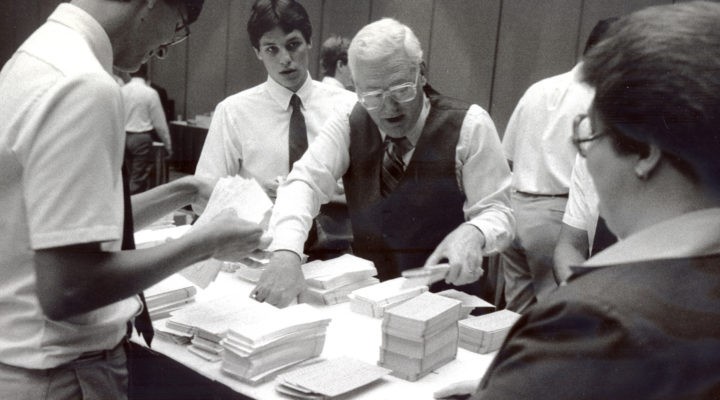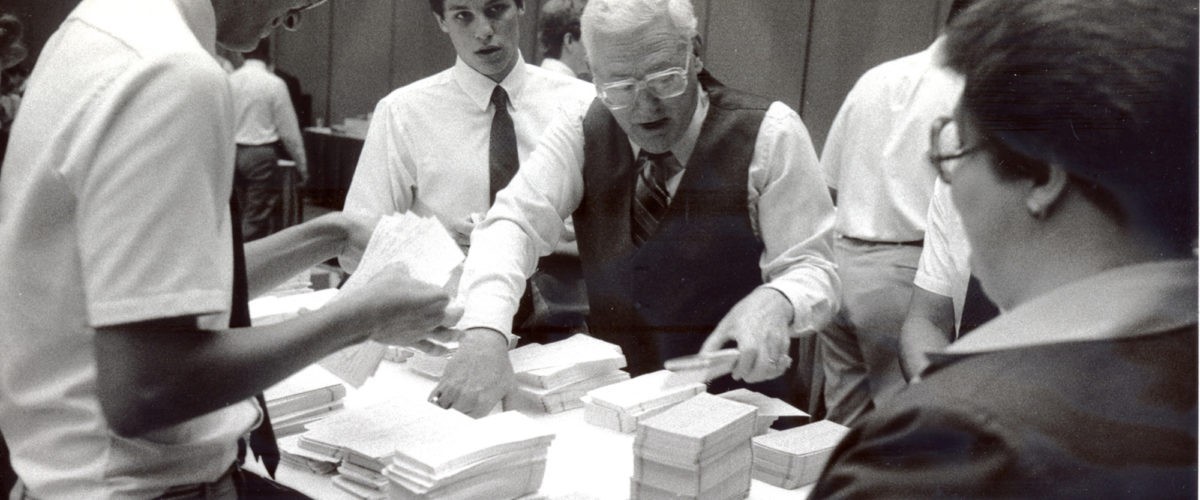This is a photo of me with my father in the upper deck of the New Orleans Superdome at the Southern Baptist Convention in June 1990. We were two of the nearly 40,000 messengers who gathered that year for a decisive vote on who would serve as president of the SBC.

Bill Wilson (right) with his father at the New Orleans Superdome in 1990.
Morris Chapman defeated Daniel Vestal to conclude an 11-year struggle for control of the nation’s largest non-Catholic denomination. The SBC was in the headlines all over our nation as we fought bitterly for control and dominance. It was ugly.
The photo was taken about the time that the decision was announced (you can see the voting ballot book in my dad’s hand), and we both were on the losing end of the result. You can probably tell that from our expressions and posture. A few minutes later, the vocal group behind us (who won the vote) began to jeer us and laugh, as the results of the vote were made public. Later, my dad would simply say, “I’m embarrassed for who Southern Baptists have become.”
Thirty years later, political divides once again have taken root in the Southern Baptist family and threaten to turn the annual meeting into an embarrassment to the cause of Christ. When they meet in Nashville next week, it is very likely that any headlines coming out of the meeting will highlight winners and losers, with righteous indignation in abundance and dire warnings of apostasy flung in every direction. Racism, misogyny, theological purity and raw power will be on full display. It will not be pretty.
Not to be outdone, other religious traditions are hard at work doing their share to embarrass Jesus. Methodists, Presbyterians, Catholics, Lutherans and nearly every American church denomination are in various stages of conflict. While we are all at each other’s throats, the percentage of Americans engaged in any denominational church is plummeting.
Sadly, these displays of spiritual immaturity on a national scale mirror much of what is being played out in local congregations. The local church is often found to be busy conforming to the world of conflict, as political opinions and strident stances on social issues take center stage and drown out the life and words of our Leader.
“These displays of spiritual immaturity on a national scale mirror much of what is being played out in local congregations.”
Rather than practicing the command of Jesus regarding conflict (See Matthew 18), or the clear teachings of Paul (Colossians 3), we embody the spirit of the Pharisees and Sadducees as we brutally critique others, demonize our opponents, assign motives to them and try to find the speck in their eye, all while conveniently ignoring the log in our own. Confessing the sins of others is now the standard approach to those with whom we disagree, and in doing so we bring more and more embarrassment upon the cause of Christ.
Any survey of the American public that addresses their feelings about organized religion inevitably reveals that those outside the church family are disgusted by such behavior and see it for what it is — an affront to who we claim to be. I meet people every week who are no longer active in congregations due to the carnage they have seen or experienced when they were active. Others, who have no interest in attending a church, tell me they avoid church people because of what they see being played out in churches. Their life, as one man told me recently, is “bad enough without the church making it worse.”
Oh, my. How have we strayed this far from who we were meant to be?
I’ve been saying for more than a decade that the defining trait of thriving clergy and congregations in the near and mid future will be their depth of humility. I’m ready to say it about denominations, conventions and denomi-networks as well. Sadly, as culture is watching closely, we continue to move in a direction diametrically opposed to what Jesus envisioned for us.
“The defining trait of thriving clergy and congregations in the near and mid future will be their depth of humility.”
There is a reason Jesus gets into intense conversations with the disciples in Mark 9 and 10 around leadership style and substance. They are parrots for the secular model of power, prestige and win-lose thinking. Jesus is having none of that and takes them on in terse and direct language.
I think he is trying to say something similar to all of us — individuals, churches and denominations — as we embark on what one SBC friend described as “our continued retreat into irrelevance.”
Just a reminder from Mark 9:42-45 of how Jesus thinks about our shenanigans related to managing conflict and differences: “You know that among the Gentiles those whom they recognize as their rulers lord it over them, and their great ones are tyrants over them. But it is not so among you; but whoever wishes to become great among you must be your servant, and whoever wishes to be first among you must be slave of all. For the Son of Man came not to be served but to serve, and to give his life a ransom for many.”
Like the disciples, we are likely to roll our eyes, rationalize our efforts at ensuring purity, and continue our retreat from Jesus. I suspect that is what we will see in Nashville and other venues in the coming months.
Perhaps, like the disciples, there will come a day when we are shaken out of our apostasy and realize Jesus wasn’t kidding. He truly wants us to transform culture rather than be conformed to it. It took Jesus being crucified before their eyes for these power-hungry disciples to grasp that the suffering servant wasn’t just a myth. It is who they and we are called to be.
What will it take for you, your church and even your denomination to grasp that core truth?
Bill Wilson serves as director of The Center for Healthy Churches in Winston-Salem, N.C., and is a member of the Baptist News Global board of directors.


